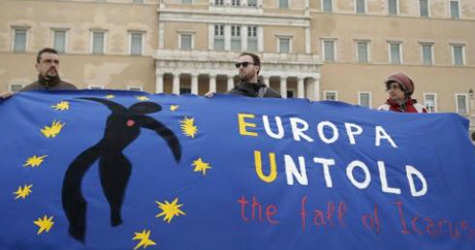For many decades, the view was widespread on the left that there was a distinct European variety of capitalism which could be positively contrasted with the Anglo-American more ‘free market’ variety. The labour movements of northern Europe were usually seen as being the decisive force behind greater state economic involvement, more capitalist cooperation with unions, and more egalitarian social welfare and labour market regimes. The development of the European Union added a further attractive dimension to this, especially for internationalists. It was considered retrograde to want to stay out, let alone get out, of the European ‘project’ at each phase of its development, with many seeing participation in its institutions as the decisive terrain for the left’s engagement.
 The hyper-austerity policies European states have pursued since 2009, contributing to the powerfully lingering effects of the first great global capitalist crisis of the 21st century, already shattered a good deal of the left’s illusions about Europe. The denouement of the Syriza strategy in Greece appears to have written finis to it.
The hyper-austerity policies European states have pursued since 2009, contributing to the powerfully lingering effects of the first great global capitalist crisis of the 21st century, already shattered a good deal of the left’s illusions about Europe. The denouement of the Syriza strategy in Greece appears to have written finis to it.
The writing was on the wall already as the European left searched for an exit from the global capitalist crisis of the 1970s. This was especially the case when the Programme Commun forged by the French Socialist and Communist Parties ran up against the implicit neoliberalism embedded in the Treaty of Rome’s ambitions for free trade and free capital flows across Europe. With the massive capital flight that pursuing Keynesian measures led to in the face of German and American monetarism, it was the German Social Democratic leader Helmut Schmidt who forced François Mitterrand‘s famous U-turn by telling him capital controls were impossible unless he abandoned the European project. The roots of the arbitrary 3 per cent ceiling on fiscal deficits in today’s European Stability Pact go back to the ceiling first imposed on the Mitterrand government in the early 1980s.
European Common Market?
Those in the Bennite wing of the British Labour Party who stood opposed to the referendum on entry to the Common Market in the mid-1970s, did so not because they were narrow fish-and-chips nationalists as they were accused of being, but because they recognized the limits joining Europe would impose on their Alternative Economic Strategy. The opposition to joining Europe on the left of the Swedish labour movement which advanced the radical wage earners fund proposals was rooted in the same recognition.
Those who subsequently looked to the emplacement of a Social Charter at the core of the process of Economic and Monetary Union were consistently disappointed on the march to the establishment of the euro common currency regime. The European Left Parties, led by Die Linke and the other representatives in the European Parliament representing the full spectrum to the left of the social democratic party bloc, have given top priority to completing economic union with a political union whereby fiscal and social policy would be centralized alongside monetary policy. This would leave less, rather than more, room for manoeuvre for the balance of class forces to be effectively registered in each European state, and especially in the smaller ones.
It is very significant that so many on the left who oppose neoliberalism, from those clinging to the legacy of Keynesianism to those carrying on the tradition of revolutionary internationalism, should have now joined their voices in supporting a Grexit, and broadly criticized the Syriza leadership for not having prepared for it. One might ask what they were thinking when Alexis Tsipras stood at the head of the European Left Party ticket in the European Parliamentary elections last year, with so many of them cheering him on.
Those of us who in discussions with Syriza leaders and activists tried to show that the EU, not just the EMU, had neoliberalism in its DNA, were nevertheless confronted with all the searching questions that Antarsya outside the party and the Left Platform inside the party never could answer. How much would advancing the prospect of this break forestall Greeks voting for Syriza with its promise to form a government to stop the economic torture within Europe? And how much of voters’ discomfort with the possibility of a break was based on a sense that the balance of forces internationally was such that Greece would be economically and politically isolated, or dependent on even more unsavoury regimes than the European ones? There was on top of this a cultural and emotional, almost psychological, commitment to Europe among large swathes, not just of the Syriza leadership, but of its political base.
It was always clear that a crucial element in the Syriza leadership would never go further than the Europeans would let them, and moreover believed that this is what Syriza’s supporters would want them to do. There were others, outside the Left Platform, whose position was more conditional, and were open to a Plan B, but understood that the political conditions for it had to be created. This required not only convincing their supporters it might be necessary but developing their capacities to engage in the economic conversion and reorganization of ways of life to adequately cope with Grexit. That could not be done without making Plan B public, however, which would undermine the ability of Syriza to get elected in the near term and to form a government to stop the economic torture within the EU.
February to June: Suspended Animation
Not only the party but also the social movements were in a state of suspended animation from February to June as everyone waited for the outcome of the negotiations. This was not something engineered from the top. One very senior minister privately expressed to me his disappointment that the social movements he had expected to light a fire behind him had become largely immobilized. Indeed, the 20 page political resolution passed at Syriza’s refounding conference in the summer 2013 had concluded by saying that the party was not a slingshot that would impel its leaders into the state and leave them there but rather the enabler of a “diverse, multidimensional movement of subversion” without which those in the state would not be able to accomplish much by way of political, economic and social transformation. That there was little spontaneous evidence of this was no doubt a relief to some in the government; but to others it was troubling. There were especially some highly capable Syriza leaders who deliberately remained in the party apparatus in order to facilitate this. But the difficulty of doing this was not just a matter of the rest of the leadership’s preoccupation with the negotiations but also the lack of capacity among Syriza activists for animating the creative plans from below to which the state would need to respond.
From the beginning the negotiations with what were now called ‘the Institutions’ could only be about the terms of neoliberal austerity. The stringency of those terms defined the scope of those negotiations by virtue of the very nature of the EU. The longer they dragged on, the more the economy was suffocated and the more it was clear that this could only result in a political crisis. It all came to a head when the government would not pay its IMF debts in June, and when its latest offer of stringent austerity measures to break the deadlock were rejected by the Institutions and even the minimal liquidity being provided by the ECB to the Greek banks was frozen. The referendum was called to prove that the Syriza government had massive public support for unleashing the funds that should have been available to Greece under the previous government’s memorandum alongside the measures for fiscal discipline and structural reform the new government was offering.
The immobilized movements were mobilized again with the referendum in a stunning display of the highly politicized character of Greek society. The OXI vote was remarkable especially in the face of the media scaremongering and economic blackmail as well as difficulties caused by the bank closures and capital controls which had been forced on the government. But, as Marx pointed out long ago, referenda to show public support for leaders are problematic displays of politicization. Their yes or no character allows for very little political intermediation. What they exactly mean and what political resources they promise beyond showing support for a leader can never be quite clear. But on the referendum’s own terms, the resounding OXI could only be read as endorsing Tsipras’s argument that the government’s latest plan was rejected by the Institutions because it redistributed, even if only marginally, the relative class burdens of austerity. The repeated promises by Syriza that this would not lead to a break from the eurozone, and the government’s release of new detailed promises to open even more sectors of the Greek economy to meet EU requirements of free trade, competitiveness and investment, was clearly aimed at undercutting popular misgivings in light of the barrage of propaganda that even membership in the EU was at stake in the vote.
There had all along been those elements in the inner cabinet who believed that the Institutions would not relent in the face of popular support but only in face of evidence that the government could ally with those who speak for domestic bourgeois elites. The divisions exposed by the referendum were especially troubling for these elements, as the venerable old Communist and Synaspismos leader, Yannis Dragasakis, the deputy prime minister, made openly clear in the middle of the referendum, while Yanis Varoufakis now tells us that he finally started really talking about Grexit, although clearly in only the most tactical and tentative ‘damned if you do and damned if you don’t’ terms.
On the basis of the massive defeat of the forces behind the Yes vote in the referendum, and the opposition party leaders resignation, the other mainstream party leaders joined with Syriza in backing the plan the Institutions had rejected before and coupled that with support for Syriza’s position. This was that once the plug had been pulled on the extension of the old government’s memorandum, they would all support coupling fiscal restraint and structural reforms with substantial debt restructuring and investment funds in immediate negotiations on a new three year memorandum. This had previously only been expected to be negotiated through the fall, leaving Syriza open to a political crisis all through the summer.
The hope that this might be pulled off was enhanced by indications that the U.S. government was putting pressure both on the IMF and the Merkel government. This was fed by IMF signals on the importance of very significant debt restructuring in a new three year deal. Wolfgang Schäuble‘s decision to try to force Grexit, on the other hand, was an expression of what had always been the key German conditions for the common currency: the ECB would act like the Bundesbank, and the euro would facilitate German exports on the basis of the same monetary stability as the Deutschmark.
But European economic union has always also been the material foundation for NATO in Europe and the deeper security linkages between capitalist European states and the American empire. The difficulty of incorporating the oligarchic capitalist Russia state into this system in any stable fashion lay behind the extension of the EU to Russia’s borders. A key question hanging over these negotiations, in fact, involved which agencies of the U.S. state would take the lead in handling the Greek problem – the U.S. Treasury or the CIA – although both were of course on very high alert. The game was being played at the highest stakes.
What Alexis Tsipras and (the new Finance Minister) Euclid Tsakalotos took to the final negotiations last Saturday, as passed by the Greek parliament, was not all that different than the plan that has been forwarded to the Institutions and rejected before the referendum. And they took courage from the fact that the negotiations were now about a new three year deal rather than continuing the drip-feeding from the old memorandum with which they had been strangled from February to June. There was now even a clear split on the side of the European interlocutors over whether to accommodate what Tsipras was bringing to the table.
But the bitter negotiations through all day Sunday and Monday morning actually turned on whether Schäuble would force a Grexit. Rather than what better terms Tsipras might come away with, the divisions on the side of the interlocutors were over whether to back or oppose Schäuble’s proposals to freeze the Greeks out. These were only bridged by humiliating and harsh language redolent of 1980s Structural Adjustment Programs with all the oversight requirements by imperial accountants that came with them, only multiplied by being embedded in European regulatory agencies and mechanisms. In terms of the actual stringency of the fiscal restraint, the extent of structural reform and the further measures to open up Greek markets to foreign capital, the difference with the plan the Syriza government had put to the Institutions before the referendum was still not that great, and even the Syriza red line on restoring basic collective bargaining rights and labour standards was not crossed. But the terms of conditionality to obtain the debt relief and investment funds that might be released over the course of this new three year memorandum are nightmarishly harsh.
Break with Capitalism?
The first of these series of Bullets from Athens was written when the final negotiations had barely started. But it ended by noting that if Tsipras came away accepting the types of conditionalities he did indeed finally sign on to in the wee hours of Monday morning, this would require everyone on the left to take a long hard look again at possibilities and implications for a break with capitalism at its ‘weakest link’. Lenin could not know when he coined this phrase that the German revolution would fail. But those who invoke the revolutionary legacy to condemn the Syriza leadership so loudly for not choosing to make a break this weekend must know that there is no prospect whatever for such a break in Germany or elsewhere in central or northern Europe in any relevant time horizon.
Those of us who counselled comrades in Syriza since even before the 2012 elections to make preparations for such a break could never pretend that the isolation in which they would find themselves would not bring with it the danger of even greater economic suffering for some considerable time than what the Greek people already had been subjected to. We could never deny that merely talking in terms of nationalizing the banks and reorganizing them around a new currency, even apart from the freezing up of economic life in the transition to this, would itself spawn new black markets, further fuelled by the inevitable rationing of many goods that would also be required by Grexit. In a society already characterized by a very large grey economy and in a state in which clientalist practices are deeply embedded, this risked corruption on a scale that even Greece has not heretofore known. But above all, could the ingenuity and resourcefulness shown by the more than 400 Solidarity networks that blossomed in the course of the crisis really be quickly enough expanded and built upon to convert patterns of production and consumption on a broad enough scale to counter these negative developments?
The frustration, depression and anger of the people who voted OXI with such pride and determination is palpable in Athens today. There is a real danger the party will split and that parts of the Syriza leadership will – reminiscent of the Ramsay Macdonald Labour Government in Britain in 1931 – kick the party away and join with the bourgeois elites in a national unity government. Were Tsipras to call instead for Grexit today there might finally be a small majority of the population who would respond positively to this. At the least, as one very knowledgeable political scientist who has been closely involved in Synaspismos and Syriza since the beginning assured me last night, there would be a million people chanting Tsipras’s name in Syntagma tonight. This would obviate the no less palpable anxiety among such people that Golden Dawn will be the beneficiary of this denouement.
It is still to be hoped that somehow the unity of Syriza can be maintained, that a national unity government will not be formed, and that a very different Plan B can yet be put into place whether under this new memorandum, or even in the unlikely event Tsipras decides to adhere to the party’s rejection of the deal. This would build on Tsipras’s consistent class discourse, already repeated when he came back to Athens yesterday promising that the oligarchs would be made to bear the main burden. But it would have to involve directing as much state and party resources as possible to plans for building economic and social alternatives at every level and the necessary transformations in the state that would be required to support these.
Some may at this point conjure up heady visions of what help Russia or China or some other capitalist regime not so fully in the embrace of the American and European agents of capitalist empire might lend to a Syriza government that had been forced to choose Grexit, without counting the many dangers and costs of this. It would be better if would-be revolutionaries calling for a break with capitalism at the weakest link would show some capacity to at least shift the balance of forces where they live. •
Leo Panitch was in Athens, Greece, at the time of writing.





